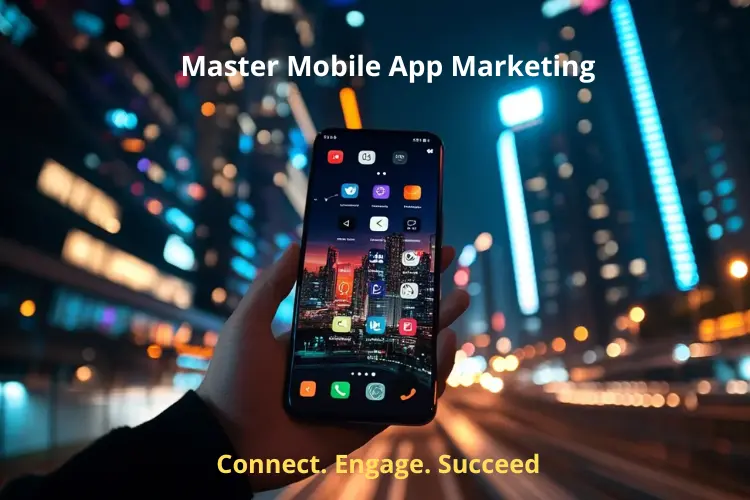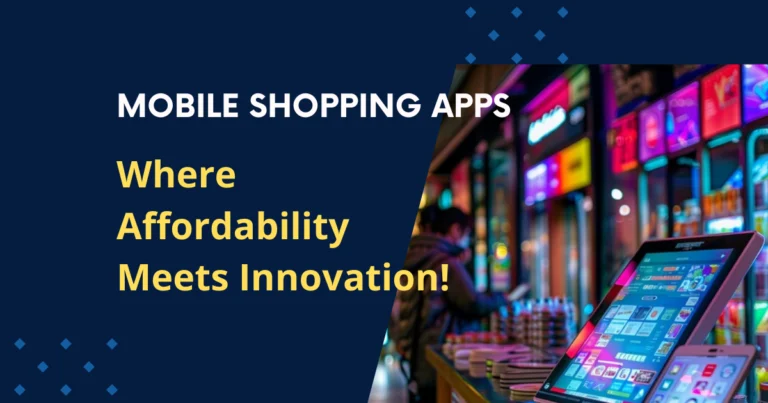Mobile App Marketing: Boosting Engagement and Success in the Digital Era

In the digital age, mobile app marketing has emerged as a cornerstone of business success. With billions of smartphone users worldwide, mobile apps provide a direct and efficient channel to engage with customers, build brand loyalty, and drive revenue. As the competition intensifies, businesses must adopt well-rounded strategies to stand out and make an impact.
This article explores the essentials of mobile app marketing, including its evolution, benefits, and proven strategies to attract users, foster engagement, and achieve sustainable growth.
Table of Contents
1. What is Mobile App Marketing?
Mobile app marketing refers to the process of promoting mobile applications to attract, engage, and retain users. It spans the entire user journey, from discovery to ongoing interaction, with the ultimate goal of creating long-term value for both users and businesses.
Key components of mobile app marketing include:
- User Acquisition: Driving downloads and sign-ups through targeted campaigns.
- Engagement: Keeping users actively involved through personalized experiences.
- Retention: Building loyalty with consistent value delivery.
Effective mobile app marketing combines market research, app store optimization (ASO), data analytics, and user feedback to ensure the app remains competitive and relevant.
2. The History of Mobile App Marketing
The evolution of mobile app marketing mirrors the rise of mobile technology and user behavior. Here’s a brief timeline:
- 2007-2008: Apple’s iPhone launch and the debut of the App Store revolutionized the industry, offering a platform for global app distribution.
- 2008-2010: Early apps relied on word-of-mouth promotion and basic SEO, with limited marketing strategies.
- 2010-2015: The rise of ASO and social media transformed app promotion. Developers started focusing on user acquisition and visibility.
- 2015-Present: Data-driven marketing, user personalization, and advanced retention strategies became the norm, emphasizing long-term user relationships.
Table 1: The History of Mobile App Marketing:
| Time Period | Key Milestones | Marketing Focus |
|---|---|---|
| 2007-2008 | – Launch of the Apple iPhone (2007) and App Store (2008). | – Developers gained global platforms for app distribution. – Minimal marketing; focus on app availability. |
| 2008-2010 | – Early app growth driven by utility-based apps. | – Promotion relied on word-of-mouth and basic SEO. |
| 2010-2015 | – Emergence of App Store Optimization (ASO). – Growth of social media platforms. | – Focus on visibility, user acquisition, and leveraging social media. |
| 2015-Present | – Adoption of data-driven strategies. – Emphasis on retention and personalization. | – Advanced tactics like personalized experiences, customer retention, and long-term user relationships. |
3. Benefits of Mobile App Marketing
Mobile apps provide businesses with a direct communication channel to reach their target audience anytime, anywhere. With features like push notifications, businesses can instantly share updates, promotions, and news with their users. This constant connection ensures high engagement rates and boosts customer satisfaction.

3.1. Personalized User Experience
Apps can collect and analyze user behavior data, enabling businesses to deliver tailored content, recommendations, and offers. Personalization increases user engagement and loyalty, as customers feel valued and understood. This targeted approach is far more effective than generic marketing efforts.
3.2. Enhanced Brand Visibility
An app icon on a user’s smartphone keeps a brand in constant view, reinforcing brand recognition and recall. This visibility ensures that your business remains top-of-mind for customers, especially when they need the products or services you offer.
3.3. Valuable Customer Insights
Mobile apps generate extensive data on user preferences, behaviors, and interactions. Businesses can use these insights to refine their marketing strategies, improve app features, and create better products and services tailored to user needs.
3.4. Increased Customer Engagement
Features like in-app messaging, gamification, and loyalty programs make apps highly engaging. They encourage users to interact with the app regularly, fostering long-term relationships that drive repeat business.
3.5. Competitive Edge
A well-designed app signals innovation and dedication to customer convenience. Businesses with a strong app presence often outperform competitors, especially in industries where customer experience is a key differentiator.
3.6. Cost-Effective Marketing
Mobile app marketing, especially through push notifications and in-app promotions, offers a cost-effective way to reach users compared to traditional advertising methods.
By leveraging these benefits, businesses can enhance customer engagement, foster loyalty, and drive sustainable growth.
4. How to Leverage Mobile App Marketing for Success
Effective mobile app marketing requires a comprehensive and strategic approach. Here are key methods to maximize the impact of your app marketing efforts:
4.1 Understand and Segment Your Audience
The foundation of any successful marketing strategy lies in understanding your target audience. Conduct in-depth market research to identify user demographics, preferences, behaviors, and pain points. Create detailed user personas that represent different audience segments. This helps tailor your app features and marketing messages to address specific needs, making your efforts more impactful.
4.2 Optimize App Store Presence
App Store Optimization (ASO) is essential for improving app discoverability. Focus on the following:
- Use relevant keywords in your app’s title, description, and tags to improve search rankings.
- Create compelling visuals, such as high-quality screenshots, engaging preview videos, and an appealing app icon.
- Encourage user reviews and ratings, as these significantly influence download decisions. Responding to reviews also shows commitment to customer satisfaction.
4.3 Leverage Social Media Marketing
Social media platforms are powerful tools for promoting mobile apps. Share engaging content, such as app usage tips, updates, behind-the-scenes glimpses, and user testimonials. Use platform-specific features, like Instagram Stories or TikTok challenges, to reach your audience creatively. Collaborating with influencers who align with your app’s niche can further enhance visibility and credibility.
4.4 Implement Content Marketing
High-quality content builds trust and authority. Create blog posts, videos, tutorials, and podcasts that educate and inform your target audience. Use SEO strategies to ensure this content ranks high on search engines. Linking this content to your app can drive organic traffic and conversions.
4.5 Use Email Marketing
Email marketing is a cost-effective way to engage users. Offer incentives like discounts or exclusive content to encourage users to sign up. Send personalized campaigns to keep users informed about app updates, new features, and special offers. Re-engage inactive users with tailored messages to bring them back.
4.6 Utilize Paid Advertising
Invest in paid campaigns to boost app visibility and downloads. Use platforms like Google Ads, Facebook, or Instagram to target specific audience segments. In-app advertising is another effective way to reach users directly within apps that cater to similar demographics.
4.7 Engage Users with Push Notifications and In-App Messaging
Push notifications and in-app messaging allow you to communicate directly with users in real time. Share updates, personalized recommendations, or promotional offers. However, avoid overloading users with notifications, as this can lead to app uninstalls.
4.8 Boost User Engagement and Retention
To retain users, focus on providing value and enhancing the user experience. Simplify the onboarding process to help users quickly understand your app’s features. Incorporate gamification elements, such as rewards, challenges, and leaderboards, to keep users engaged. Regularly update your app with new features and improvements to address user feedback and keep it fresh.
4.9 Analyze Performance and Adapt Strategies
Track key metrics like downloads, retention rates, and user behavior using analytics tools. Perform A/B testing to experiment with different app features, marketing campaigns, and messages. Regularly collect user feedback to identify areas for improvement.
4.10 Build a Community Around Your App
Foster a sense of belonging by creating a community around your app. Use in-app discussion forums, social media groups, or exclusive events to engage users. Host webinars, Q&A sessions, and other interactive events to add value. Ensure customer support is responsive and accessible to address user concerns.
By employing these strategies, businesses can create impactful marketing campaigns that attract new users, engage existing ones, and drive long-term growth. Success in mobile app marketing requires constant innovation, data-driven decision-making, and a user-centric approach.
5. Use Cases: Harnessing Mobile App Marketing for Long-Term Success
Use Case 1: Gamification for User Engagement
App: Duolingo
Strategy: Gamification elements like streaks, leaderboards, and rewards to boost engagement.
Impact:
- Increased user retention by 56% in the first month.
- Over 500 million downloads worldwide.
Use Case 2: Push Notifications to Increase Retention
App: Starbucks
Strategy: Personalized push notifications for promotions, order updates, and loyalty rewards.
Impact:
- Achieved a 16% increase in app retention rate with personalized notifications.
- Push notifications contributed to a 29% increase in in-store purchases.
Use Case 3: Social Media Ads for User Acquisition
App: TikTok
Strategy: Leveraging Instagram and Facebook ads targeting Gen Z users.
Impact:
- Achieved over 1 billion active users by 2024.
- 49% of users downloaded the app after seeing ads on social media.
Use Case 4: App Store Optimization (ASO) for Visibility
App: Calm
Strategy: Optimized app descriptions, keywords, and visuals to enhance discoverability.
Impact:
- Ranked #1 in Health & Fitness category in over 50 countries.
- Downloads increased by 28% in six months due to ASO improvements.
Use Case 5: Paid Advertising for App Installs
App: Uber
Strategy: Google Ads and YouTube campaigns targeting urban users needing transportation solutions.
Impact:
- Achieved 1 billion app downloads globally by 2023.
- Paid campaigns contributed to a 35% increase in downloads during targeted promotional periods.
Use Case 6: Loyalty Programs via In-App Marketing
App: Sephora
Strategy: Implemented an in-app loyalty program allowing users to earn points for purchases and redeem them for rewards.
Impact:
- Mobile app users contributed to 70% of the total loyalty program revenue in 2024.
- Increased user retention by 25% over a year.
Use Case 7: Email Marketing for Re-engagement
App: Spotify
Strategy: Personalized email campaigns promoting new features and curated playlists.
Impact:
- Increased reactivation of dormant users by 12%.
- Enhanced premium subscriptions by 8% within three months of campaign launch.
Conclusion
Mobile app marketing has become an indispensable strategy in today’s mobile-first world, offering businesses unparalleled opportunities to connect with their audience, drive engagement, and achieve sustainable growth. By understanding its history, leveraging its benefits, and implementing effective strategies, businesses can stand out in a highly competitive app ecosystem.
The key to success lies in adopting a user-centric approach. This involves personalizing user experiences, optimizing app store visibility, leveraging social media, and using data-driven insights to refine marketing strategies. Tools like push notifications, gamification, and loyalty programs can further enhance engagement and retention.
As technology evolves, so must your strategies. Regularly updating your app, responding to user feedback, and staying ahead of trends will ensure your app remains relevant and competitive. By building strong relationships with users and fostering a sense of community, mobile app marketing can become a powerful driver of long-term business success.







7 Comments
Comments are closed.